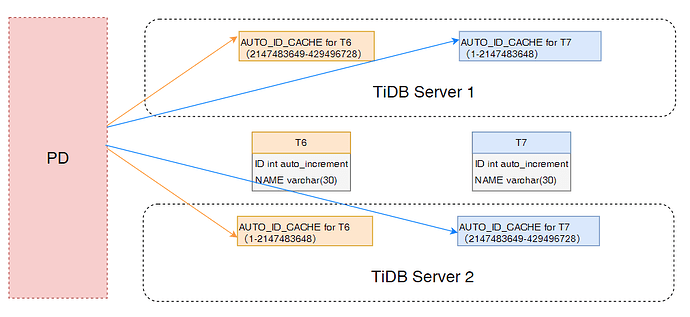The magical performance is here, the auto-increment in TiDB didn’t change.
test case:
drop table t8;
create table t8 (
a int(1) primary key, -- diff
id int(1) not null auto_increment,
name varchar(64),
key idx_id(`id`)
) engine=innodb;
insert into t8 values(1,1,'chen'),(2147483646,2147483646,'wu');
show create table t8\G
insert into t8 (`a`,`name`) values(2147483647,'a47');
show create table t8\G
mariadb
AUTO_INCREMENT increases by 1
mysql> show create table t8\G
*************************** 1. row ***************************
Table: t8
Create Table: CREATE TABLE `t8` (
`a` int(1) NOT NULL,
`id` int(1) NOT NULL AUTO_INCREMENT,
`name` varchar(64) COLLATE utf8mb4_unicode_ci DEFAULT NULL,
PRIMARY KEY (`a`),
KEY `idx_id` (`id`)
) ENGINE=InnoDB AUTO_INCREMENT=2147483647 DEFAULT CHARSET=utf8mb4 COLLATE=utf8mb4_unicode_ci
1 row in set (0.00 sec)
mysql> insert into t8 (`a`,`name`) values(2147483647,'a47');
Query OK, 1 row affected (0.01 sec)
mysql> show create table t8\G
*************************** 1. row ***************************
Table: t8
Create Table: CREATE TABLE `t8` (
`a` int(1) NOT NULL,
`id` int(1) NOT NULL AUTO_INCREMENT,
`name` varchar(64) COLLATE utf8mb4_unicode_ci DEFAULT NULL,
PRIMARY KEY (`a`),
KEY `idx_id` (`id`)
) ENGINE=InnoDB AUTO_INCREMENT=2147483648 DEFAULT CHARSET=utf8mb4 COLLATE=utf8mb4_unicode_ci
1 row in set (0.00 sec)
mysql> select * from t8;
+------------+------------+------+
| a | id | name |
+------------+------------+------+
| 1 | 1 | chen |
| 2147483646 | 2147483646 | wu |
| 2147483647 | 2147483647 | a47 |
+------------+------------+------+
3 rows in set (0.00 sec)
tidb
AUTO_INCREMENT doesn’t change?
tidb> show create table t8\G
*************************** 1. row ***************************
Table: t8
Create Table: CREATE TABLE `t8` (
`a` int(1) NOT NULL,
`id` int(1) NOT NULL AUTO_INCREMENT,
`name` varchar(64) DEFAULT NULL,
PRIMARY KEY (`a`) /*T![clustered_index] CLUSTERED */,
KEY `idx_id` (`id`)
) ENGINE=InnoDB DEFAULT CHARSET=utf8mb4 COLLATE=utf8mb4_bin AUTO_INCREMENT=2147513647
1 row in set (0.00 sec)
tidb> insert into t8 (`a`,`name`) values(2147483647,'a47');
Query OK, 1 row affected (0.01 sec)
tidb> show create table t8\G
*************************** 1. row ***************************
Table: t8
Create Table: CREATE TABLE `t8` (
`a` int(1) NOT NULL,
`id` int(1) NOT NULL AUTO_INCREMENT,
`name` varchar(64) DEFAULT NULL,
PRIMARY KEY (`a`) /*T![clustered_index] CLUSTERED */,
KEY `idx_id` (`id`)
) ENGINE=InnoDB DEFAULT CHARSET=utf8mb4 COLLATE=utf8mb4_bin AUTO_INCREMENT=2147513647
1 row in set (0.00 sec)
tidb> select * from t8;
+------------+------------+------+
| a | id | name |
+------------+------------+------+
| 1 | 1 | chen |
| 2147483646 | 2147483646 | wu |
| 2147483647 | 2147483647 | a47 |
+------------+------------+------+
3 rows in set (0.00 sec)
